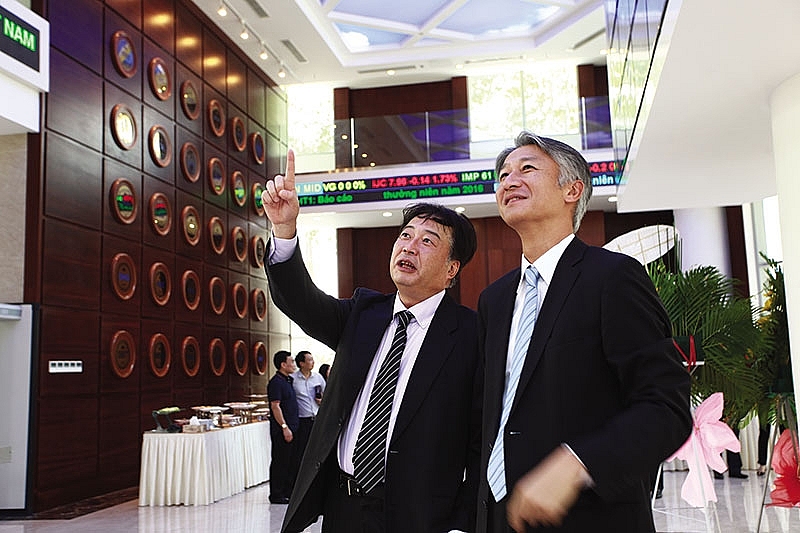Two years later, FOLs an issue again
 |
| Although some have called for increased foreign stakes in local firms, others are wary of longer term consequences, Photo: Le Toan |
Not quite a boom
It has been more than two years since Decree No.60/ 2015/ND-CP allowed listed Vietnamese firms to scrap their foreign ownership limit (FOL). However, contrary to expectations, only 20 businesses out of 700 firms currently trading on the stock exchange have abandoned the cap as of April 2018. A lot of firms still retain their 49 per cent FOL; in the case of financial institutions, the 30 per cent threshold remains firmly in place.
With foreigners buying $1.5 billion worth of shares on the local stock exchanges and pouring in $6.2 billion of indirect investments in total - both a 45 per cent increase year-on-year, investors and policymakers are revisiting the FOL issue.
According to Le Hai Tra, board member of the Ho Chi Minh City Stock Exchange (HOSE), discrepancies between the Law on Enterprises, the Securities Law, and Decree No.60 make it difficult to determine if a listed firm becomes a foreign entity when the amount of foreign-owned shares surpasses 51 per cent.
“The FOL, combined with the low percentage of free-float shares and significant number of state-owned shares, really limits the investable space for overseas investors,” Tra admitted. Around 36 firms, the capitalisation of which takes up one third of HOSE, have free-float ratios of less than 20 per cent.
A major roadblock for Vietnamese firms is their activity in a conditional sector, usually real estate or retail. However, a handful of companies have found a way to avoid this issue, which includes moving all of their conditional businesses to a subsidiary. Dairy giant Vinamilk, pharmaceutical producer Duoc Hau Giang, and construction firm Coteccons JSC are a few examples.
Yeu Huan Lai, senior portfolio manager at Nikko Asset Management, said that even if the FOL is lifted, the state can employ other strategies to control the capital inflows, for instance requiring investors who wish to buy more than 5 per cent of shares to obtain governmental approval.
“Here’s an example. There is no FOL on Singaporean banks, but it’s really hard to buy more than 5 per cent in the banks there, as everything is subject to official approval. If the government thinks you are not qualified to be a major investor at the bank, you won’t be allowed to buy the shares,” Lai told VIR.
A more critical view of FOL
Others are looking at this issue from a different viewpoint. If all Vietnamese firms abandon their FOL, they could become entirely dependent on foreign capital flows, which might be withdrawn from the country at any time. This could be a significant risk to the entire financial system, especially during volatile periods on the global market.
In fact, back in 2008, a significant amount of foreign capital fled Vietnam as the stock market crashed and a global economic crisis ensued. The country then suffered through a period of instability, which included amassing bad debts, soaring inflation rates, a real estate overabundance, and constant devaluation of the VND.
Dominic Scriven, chairman of Dragon Capital Group and a veteran investor in Vietnam, told VIR that the Vietnamese market should ensure that it can absorb any shock caused by the sudden withdrawal of foreign capital before telling all firms to scrap the FOL. According to Scriven, the only way to do this is to improve market liquidity and transparency as well as ease of access to foreign exchange markets, and to boost the market size.
“Foreign indirect capital can be speculative hot money. Vietnam should make sure that a large part of its foreign inbound money will stay here for the long term and contribute more than just capital to a firm. This may include helping with corporate governance and business activities,” said Scriven.
Meanwhile, Pham Hong Hai, CEO of HSBC Vietnam, pointed out that Vietnam has been doing well in luring strategic investment from overseas, which tends to be long-term capital with the intention of improving a business. Hai said that Vietnam’s growing foreign currency reserve, which has surpassed $60 billion this year, can offer good assistance in stabilising the market.
“The amount of foreign inflow actually matters less than how Vietnamese firms, and the Vietnamese economy in general, can make the best use out of it,” said Hai.
What the stars mean:
★ Poor ★ ★ Promising ★★★ Good ★★★★ Very good ★★★★★ Exceptional
Related Contents
Latest News
More News
- Tax sector wraps up 2025 and sets priorities for next year (December 25, 2025 | 14:00)
- A tipping point for digital and hybrid wealth management in Vietnam (December 23, 2025 | 13:33)
- $250 million deal targets women-owned SMEs, sustainable agriculture (December 22, 2025 | 17:40)
- Stock market posts resilient 2025 performance (December 19, 2025 | 18:17)
- Citi Vietnam receives 2025 AmCham CSR recognition (December 19, 2025 | 16:35)
- As global green supply chain reshapes, will Vietnam be left behind? (December 19, 2025 | 08:00)
- Banks gear up for massive capital increases (December 18, 2025 | 17:04)
- Securing capital and efficiency for Vietnam’s 2026-2030 growth ambitions (December 17, 2025 | 10:00)
- Energy sector in need of blended finance mechanisms (December 17, 2025 | 09:00)
- Vietnam still has room to mobilise capital for sustainable growth (December 17, 2025 | 08:57)

 Tag:
Tag:





















 Mobile Version
Mobile Version